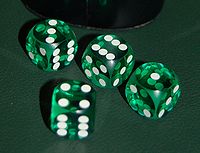Libertarianisme (metafisika)

Libertarianisme adalah salah satu pandangan filosofis yang terkait dengan masalah kehendak bebas dan determinisme.[1] Libertarianisme merupakan pandangan yang bersifat inkompatibilis,[2][3] dan menekankan bahwa kehendak bebas secara logis tidak sesuai dengan konsep alam semesta yang deterministik, dan karena manusia memiliki kehendak bebas maka determinisme itu salah.[4] Walaupun kompatibilisme (yaitu pandangan bahwa determinisme dan kehendak bebas tidak bertentangan secara logis) merupakan posisi yang paling populer di antara filsuf-filsuf profesional,[5] libertarianisme metafisis juga didiskusikan (walaupun bukan berarti didukung) oleh Peter van Inwagen, Robert Kane, Robert Nozick,[6] Carl Ginet, Hugh McCann, Harry Frankfurt, E.J. Lowe, Alfred Mele, Roderick Chisholm, Daniel Dennett,[7] Timothy O'Connor, Derk Pereboom, dan Galen Strawson.[8]
Istilah "libertarianisme" dalam arti metafisis atau filosofis pertama kali digunakan oleh pemikir bebas dari abad pencerahan.[9] Istilah ini pertama kali tercatat dalam tulisan William Belsham pada tahun 1789.[10][11]
Catatan kaki[sunting | sunting sumber]
- ^ Strawson, Galen (1998, 2004). Free will. In E. Craig (Ed.), Routledge Encyclopedia of Philosophy. London: Routledge. Diakses pada 31 Juli 2009
- ^ Strawson, Galen (1998, 2004). Free will (section 2) Diarsipkan 2009-09-23 di Wayback Machine.. In E. Craig (Ed.), Routledge Encyclopedia of Philosophy. London: Routledge. Diakses pada 31 Juli 2009. "These anti-compatibilists or incompatibilists divide into two groups: the libertarians and the no-freedom theorists or pessimists about free will and moral responsibility."
- ^ Timpe, Kevin (2006) Free Will di Feiser, J and Dowden, B (Eds.) 'Internet Encyclopedia of Philosophy'. Diakses pada 31 Juli 2009 "Other incompatibilists think that the actual world is not deterministic and that at least some of the agents in the actual world have free will. These incompatibilists are referred to as "libertarians" [lihat Kane (2005), terutama bab 3 dan 4]."
- ^ Strawson, Galen (1998, 2004). Free will (section 2) Diarsipkan 2009-09-23 di Wayback Machine.. In E. Craig (Ed.), Routledge Encyclopedia of Philosophy. London: Routledge. Diakses pada 31 Juli 2009. "They [libertarians] hold (1) that we do have free will, (2) that free will is not compatible with determinism, and (3) that determinism is therefore false."
- ^ Nichols, Shaun: The Rise of Compatibilism: A Case Study in the Quantitative History of Philosophy
- ^ Nozick, Robert. Philosophical Explanations. 1981: Harvard University Press.
- ^ Dennett, D. Freedom Evolves.Viking Books, February, 2003 ISBN 0-670-03186-0
- ^ Strawson, Galen. "Free Will" di Routledge Encyclopedia of Philosophy, penyunting Edward Craig (1998); "The Bounds of Freedom" dalam The Oxford Handbook of Free Will, penyunting Robert Kane (2002).
- ^ David Boaz, Libertarianism: A Primer, Free Press, 1998, 22-25.
- ^ William Belsham, "Essays", dicetak untuk C. Dilly, 1789; awalnya dari Universitas Michigan, didigitalisasi 21 Mei 2007, p.11.
- ^ Oxford English Dictionary definition of libertarianism.
Pranala luar[sunting | sunting sumber]
- Stanford Encyclopedia of Philosophy
- M. Huemer: A Proof of Free Will
- Peter Van Inwagen: The Mystery Of Metaphysical Freedom
- Collection of papers on various aspects of Free Will and Determinism hosted by Ted Honderich
- Information Philosopher
- MindPapers Collection of articles on Libertarianism about Free Will
